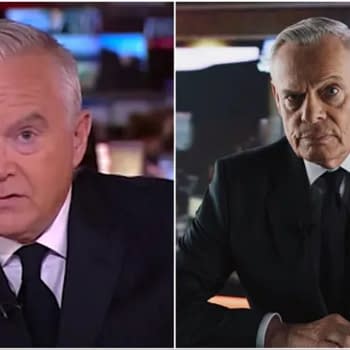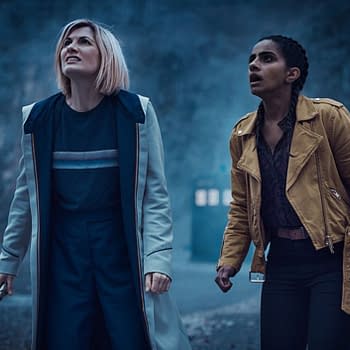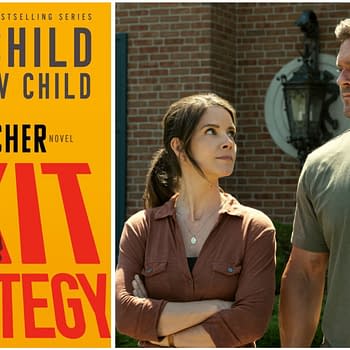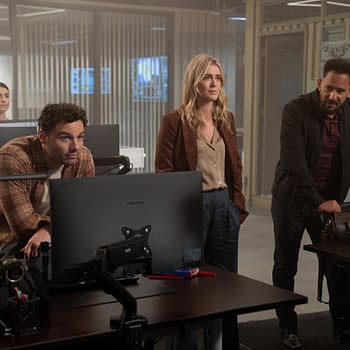Posted in: Audio Dramas, BBC, Doctor Who, TV | Tagged: Audio Drama, doctor who, Doctor Who: Death Comes to Time, John Sessons, Kevin Eldon, sophie aldred, stephen fry, sylvester mccoy
Doctor Who: The Seventh Doctor's Odd Canon-Breaking Final Story
Before Doctor Who returned in 2005, there was an odd A-List audio drama in 2001 that was supposed to be the Seventh Doctor's "grand finale."
When Doctor Who was cancelled in 1989, the Seventh Doctor (Sylvester McCoy) and Ace (Sophie Aldred) were last seeing walking off to their next adventure. Before the series was revived in 2005, one attempt to give them a grand sendoff was in fact produced by the BBC and streamed online as an audio drama in 2001. Doctor Who: Death Comes to Time starred McCoy and Aldred, and it was very weird. It ignored a lot of continuity of the TV series and even broke canon altogether.
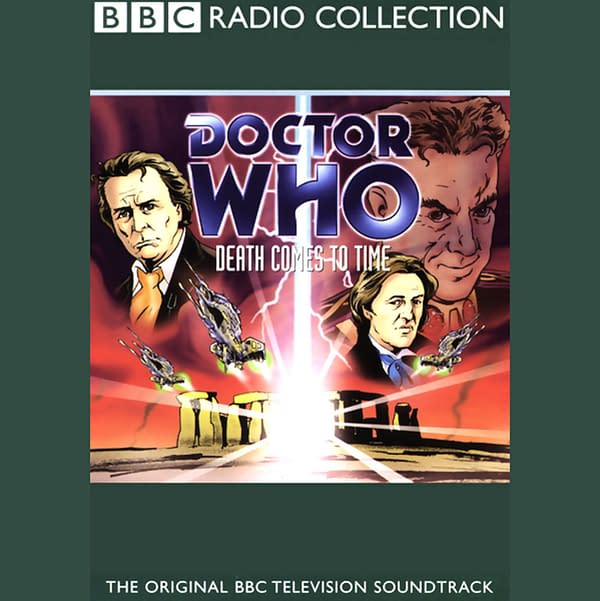
The Doctor Who Broadcast Drought of the 1990s and early 2000s
Back in the 1990s, with Doctor Who gone from television, possibly forever, fans were desperate for more stories, and the Virgin New Adventures novels filled that gap during the 1990s before the 1996 TV movie starring Paul McGann as the Eighth Doctor came along. At the start of that story, the Seventh Doctor was unceremoniously shot when he unwittingly walked into a gang shootout before he regenerated into the next Doctor. Fans have never been happy with the Seventh Doctor's ending, and many writers have thought about how the Seventh Doctor should have a better final story after the fact. One was attempted in the final Virgin Seventh Doctor novel "Lungbarrow" in 1997, which ends before he heads off to Skaro to pick up the Master's remains, leading to the TV movie.
When a new series wasn't commissioned for television, Doctor Who went back to the wilderness with BBC Books taking over the novel range, bringing over many of the Virgin authors to write stories featuring the Eighth Doctor. Big Finish had begun producing audio dramas featuring the Fifth, Sixth, and Seventh Doctors and their companions, played by the original actors, but those were stories set during their time on the show and weren't necessarily considered canon. Eventually, they would create their own continuities with new companions, even incorporating the companions and continuity from the Virgin novels into the Seventh Doctor audio dramas. Then there was Doctor Who: Death Comes to Time.
An A-List BBC Audio Drama
Death Comes to Time was the first "official" BBC story that featured the Seventh Doctor's "final story." And if fans hate the "Timeless Child' retcon, the canon didn't just retcon in Death Comes to Time but seemed to take place in a completely different universe that happened to feature the Doctor, Ace, and Timelords. Written by its producer Dan Freedman under the pseudonym Colin Meeks, the serial set out to create a sweeping Science Fiction epic across the cosmos with a lot of famous British names in the cast, including comedian John Sessions as the gleefully sadistic and camp "big bad" General Tannis, Kevin Eldon as the Doctor's newest companion Antimony, and Stephen Fry as The Minister of Chance who would later spin off into the main character in Freedman's own Science Fiction audio series not officially part of Doctor Who. Nicholas Courtney also appears as the Brigadier when the story touches down on Earth.
Alternate Universe Tale or Fan Fiction?
Death Comes to Time could be called fan fiction in the way it changes canon to do whatever it wants. It takes common tropes from the Seventh Doctor stories: an evil tyrant threatens to conquer and destroy entire worlds, and it's up to the Doctor and his companion to stop him. It even draws from the Virgin novels in showing that Ace has not been a companion for some time and has been on her own adventures before circumstances reunite them. There are many elements very different from what we know. It takes the mystery and darker aspects of the Seventh Doctor and creates its own thing where he's a chess player of events again, but on an even bigger scale than in the TV series or books.
Here, the Timelords are god-like entities who can control all of time and space, which is why the Doctor has to follow a code where he refuses to use his omnipotence to solve every problem, simply wipe out every evil despot, and risk becoming a tyrant himself. Stephen Fry plays The Minister as a renegade Timelord who starts to use his powers to intervene to save people, which damages Time and drives the Doctor to destroy him with a command. It seems the Doctor is the leader of the Timelords in this story, with power even over all of them. Ace has been training to become a Timelord, which was the original series' plan for her ending and faces a Jedi-style trial of overcoming her own mental and emotional obstacles. In the end, an ultimate sacrifice is made that seems to ignore or sidestep the TV movie's regeneration, and Ace is left as the last Timelord in the universe. It's all a bit strange but not uninteresting curio, and who knows, maybe it's some fans' headcanon.
Death Comes to Time seems to be largely forgotten. It's seldom talked about, even less than Scream of the Shalka, and is no longer available on the BBC website. It has been out of print on CD but is now available on Audible.




